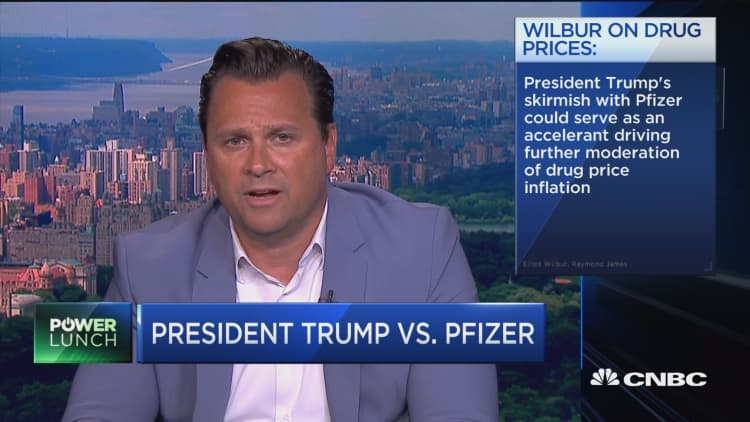
Some drug companies have continued to increase prices despite growing public discontent, a move that senior equity analyst Elliot Wilbur told CNBC "makes absolutely no sense."
"It’s simply bad decision-making and terrible policy on [a drug company's] part," Wilbur, who focuses on pharmaceuticals at financial firm Raymond James, said Monday on "Power Lunch."
Pfizer, one of the largest drug companies in the world in terms of sales, raised list prices at the beginning of July for more than 40 of its prescriptions. The move marks the second round of increases this year.
Wilbur pointed out that Viagra, made by Pfizer, has increased at a rate of nearly 25 percent over the last four years, even though the generic form of the drug, sildenafil, is available.
"They’re essentially gaining none of the benefits and receiving all the bad publicity," Wilbur said, since consumers can simply opt for the cheaper version.
Pfizer could not immediately be reached for comment.
In a note for his firm last week, Wilbur pointed out that President Donald Trump's tweets, which have directly taken aim at pharmaceuticals, can't be ignored for their impact on the industry.
"With 30 seconds of effort, President Donald Trump stopped the largest pharmaceutical company in the world from conducting business as usual while at the same time getting the attention of every C-suite executive and board member in the industry," he wrote in the note.
On July 9, Trump tweeted "Pfizer & others should be ashamed that they have raised drug prices for no reason. They are merely taking advantage of the poor & others unable to defend themselves, while at the same time giving bargain basement prices to other countries in Europe & elsewhere. We will respond!"
Pfizer responded to the tweet by saying that it would postpone price increases until after the CEO and the president spoke.
But Wilbur said the delay "is merely temporary."
"We'd be willing to wager that the indicated list prices increases aren't as extensive or as large of a magnitude when or if they are eventually implemented," Wilbur wrote in the note.
On Monday, Wilbur said the pharmaceutical industry has "lost a tremendous amount of lobbying power over the years," in part because of the president's influence on social media. But he also acknowledged that "the pharmaceutical industry is very much addicted to price inflation in terms of growth."
Pharmaceutical sales, Wilbur said, have grown at a rate of about 4 percent annually over the last 15 years — and only 1 percent of that growth has come from new products, Wilbur said. However, 8 percent of growth has come from price inflation, the analyst said.
"As much as these companies want to police themselves and lower the overall rate of increases," Wilbur said. "It’s very difficult for them to generate sales growth without having the benefit of price inflation."


